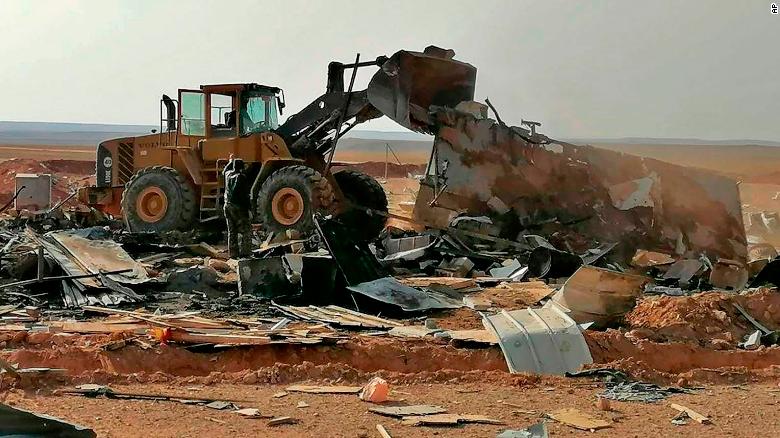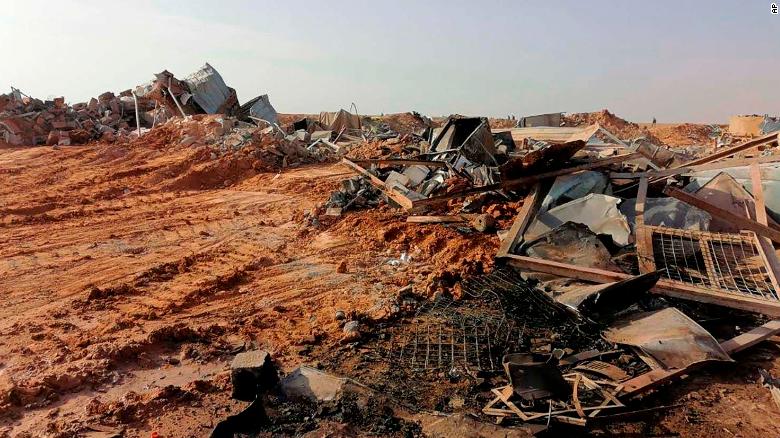 Fighters with the Kataib Hezbollah militia search for bodies in the aftermath of a US airstrike.
For the Iraqi government, the face-off between the US and pro-Iranian militia adds another source of instability in a country already deep in crisis. Roiling popular protests since October have pitted young Iraqis fed up with corruption and the lack of opportunity against the security forces and militia like Kata'ib who are accused of some of the harshest actions against demonstrators. The US has already sanctioned a leading Kataib Hezbollah official for human rights abuses. At least 485 people have been killed since protests erupted and at least 27,000 people have been injured, according to the Independent High Commission for Human Rights of Iraq.
The unrest has further weakened an already fragile economy and has triggered a political meltdown. Prime Minister Adil Abdul-Mahdi has resigned but no consensus candidate has yet emerged to replace him. Two constitutional deadlines to nominate a successor have come and gone.
In many places, the protests have taken on an anti-Iranian flavour, with the Iranian consulate in the city of Najaf torched last month.
Iraqi President Barham Salih, a Kurd, last week threatened to quit "to avoid more bloodshed and in order to safeguard civil peace" rather than approve a candidate for Prime Minister seen as pro-Iranian. Thousands of protestors, who are demanding fresh elections and an end to the domination of existing political blocs, took to the streets in support of Salih's stand.
But Iran has invested heavily in deepening its influence in an arc from Iraq through Syria to Lebanon and will not give up its strategic gains without a fight, even as US sanctions make its expansionism difficult to afford.
Fighters with the Kataib Hezbollah militia search for bodies in the aftermath of a US airstrike.
For the Iraqi government, the face-off between the US and pro-Iranian militia adds another source of instability in a country already deep in crisis. Roiling popular protests since October have pitted young Iraqis fed up with corruption and the lack of opportunity against the security forces and militia like Kata'ib who are accused of some of the harshest actions against demonstrators. The US has already sanctioned a leading Kataib Hezbollah official for human rights abuses. At least 485 people have been killed since protests erupted and at least 27,000 people have been injured, according to the Independent High Commission for Human Rights of Iraq.
The unrest has further weakened an already fragile economy and has triggered a political meltdown. Prime Minister Adil Abdul-Mahdi has resigned but no consensus candidate has yet emerged to replace him. Two constitutional deadlines to nominate a successor have come and gone.
In many places, the protests have taken on an anti-Iranian flavour, with the Iranian consulate in the city of Najaf torched last month.
Iraqi President Barham Salih, a Kurd, last week threatened to quit "to avoid more bloodshed and in order to safeguard civil peace" rather than approve a candidate for Prime Minister seen as pro-Iranian. Thousands of protestors, who are demanding fresh elections and an end to the domination of existing political blocs, took to the streets in support of Salih's stand.
But Iran has invested heavily in deepening its influence in an arc from Iraq through Syria to Lebanon and will not give up its strategic gains without a fight, even as US sanctions make its expansionism difficult to afford.
 The headquarters of Kataib Hezbollah lies in ruins in the aftermath of a US airstrike in Qaim, Iraq.
The political deadlock in Baghdad is beginning to look like a struggle between pro-Iranian Shia groups and Iraqi nationalists. And the airstrikes will embolden the pro-Iranian blocs in parliament to push again for the expulsion of US forces from Iraq.
The last time they left, at the end of 2011, ISIS took full advantage. The remnants of the group may now be savouring a new opportunity. They have been regrouping underground in provinces north of Baghdad. There has been a steady uptick in ambushes, bomb attacks and assassinations claimed by the group in the latter half of this year.
A proxy war between US forces and pro-Iranian groups that are notionally tied into the Iraqi military would make counter-terrorism operations -- the very reason the US still has 5,000 troops in Iraq -- more difficult.
The headquarters of Kataib Hezbollah lies in ruins in the aftermath of a US airstrike in Qaim, Iraq.
The political deadlock in Baghdad is beginning to look like a struggle between pro-Iranian Shia groups and Iraqi nationalists. And the airstrikes will embolden the pro-Iranian blocs in parliament to push again for the expulsion of US forces from Iraq.
The last time they left, at the end of 2011, ISIS took full advantage. The remnants of the group may now be savouring a new opportunity. They have been regrouping underground in provinces north of Baghdad. There has been a steady uptick in ambushes, bomb attacks and assassinations claimed by the group in the latter half of this year.
A proxy war between US forces and pro-Iranian groups that are notionally tied into the Iraqi military would make counter-terrorism operations -- the very reason the US still has 5,000 troops in Iraq -- more difficult.
DISCLAIMER: The Views, Comments, Opinions, Contributions and Statements made by Readers and Contributors on this platform do not necessarily represent the views or policy of Multimedia Group Limited.
Latest Stories
-
Ghana’s emerging economic potential – Ekumfi and Natural Juices Industries
2 mins -
Global economy resilient; to expand by 3.2% in 2024 – IMF
20 mins -
NDC takes on Akufo-Addo over renaming and relocation of Ameri Power Plant
40 mins -
First product of Meghan’s lifestyle brand revealed
40 mins -
West African leaders dial down on Togo mission
47 mins -
Season 5 of BMPS Show on Joy Prime takes off on April 18
48 mins -
Election 2024: EC opens applications for various positions
50 mins -
Senegal seizes over a tonne of cocaine in record haul
53 mins -
Another man jailed for 8 months over missing genitals
57 mins -
Man, 40, in police grips for having sex with a goat
1 hour -
Bayern Munich: Harry Kane says season will be failure if they fail to win Champions League
1 hour -
Werder Bremen suspend Naby Keita until end of season
1 hour -
It hurts to be labelled a thief – Joseph Osei-Owusu
1 hour -
Finance Minister, BoG Governor leads Ghana’s delegation to IMF/World Bank Spring Meetings in Washington
1 hour -
My experience will make me a better President than I was – Mahama
1 hour

